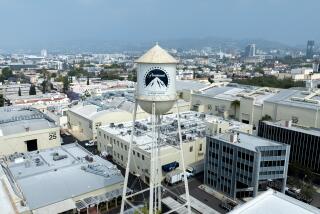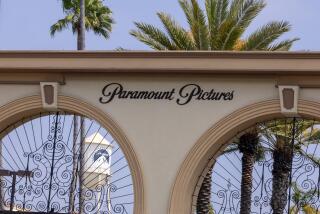Wall St. Salivates as Singleton Mulls Empire’s Breakup
- Share via
Henry E. Singleton built an empire of businesses across the aerospace, manufacturing and insurance fields in the 1970s and ‘80s. But at age 75, Singleton’s primary occupation now is listed as “New Mexico rancher.” And he has begun methodically deconstructing his billion-dollar corporate fiefdom.
Wall Street, always interested in the machinations of legendary investors, has good reason to speculate about how the highly secretive Singleton might dispose of various pieces of his empire: Guess correctly and your profit could be handsome indeed, because Singleton’s companies all are publicly traded.
The latest Singleton Watch was kicked off by two big moves in recent weeks:
* On Jan. 21, Lyndhurst, N.J.-based Curtiss-Wright Corp. put its two key aerospace businesses up for sale, effectively setting the stage for the firm’s liquidation. That will produce a windfall for Singleton’s two insurance companies, Unitrin Inc. and Argonaut Group, which own 43% and 8% of C-W shares, respectively.
C-W stock, languishing around $30 at year’s end, has since leaped to $39.75 on the New York Stock Exchange as traders try to figure the company’s ultimate “takeout” value.
* On Feb. 3, Litton Industries agreed to pay Teledyne Inc. $51 a share, or $86 million, for the 4.1% Litton stake that Teledyne owns. The two Los Angeles companies, linked since the early days of Singleton’s conglomerate building (Teledyne was his flagship company), will sever the last of their ties with the Litton buyback.
Because the $51-a-share price tag was a 7% premium to Litton’s market price of $47.625 at the time, the news caused Wall Street to suddenly re-evaluate Litton’s worth.
More important, Teledyne’s decision to sell its stake focused attention on Singleton’s bigger stake in Litton: The 31%, or 12.1 million shares, owned by Chicago-based Unitrin, which Singleton chairs. He spun Unitrin off from Teledyne in 1990.
Do the Curtiss-Wright and Teledyne moves suggest that Singleton is prepping for Unitrin to sell its Litton shares? Maybe, says Byron Callan, analyst at Prudential Securities. At the very least, “they’ve put the duck out in the open,” he notes.
But first, one has to ask why Singleton is deconstructing to begin with. The logical answer is that, at his age, estate disposition is a big concern. How far he plans to go, however, is anyone’s guess.
Second, there’s the question of whether Litton is a true takeover target by virtue of Unitrin’s stake.
The attraction of Litton is that its stock probably doesn’t reflect the real value of its pieces. Two of those pieces are defense-related (electronics and shipbuilding) and are unexciting to Wall Street. But the other two--oil field services and factory automation--are great businesses.
If someone were to get control of Litton and break it up, Callan believes that the sum of the parts would be in the mid-$60s a share versus the stock’s current price of $49.75. John Simon, analyst at Seidler Amdec Securities, believes that the value is more like $75 a share. In any case, Simon says, “Litton is a terribly undervalued stock.”
But would Henry Singleton consider selling to a raider? Doubtful, most analysts agree. Another possibility would be for Litton to buy the Unitrin block itself--except that it probably couldn’t afford the $630-million-plus price.
Ultimately, though, Litton’s underlying value is bound to be realized, many analysts argue. With the stock selling for just 12 times last year’s earnings per share, they point out, it’s an intriguing buy if you’re willing to wait.
Meanwhile, back on Wacker Drive in Chicago, there’s Unitrin. That stock, at $43.25 a share now on NASDAQ, may be the most compelling Singleton play of all, say some Wall Streeters.
“Unitrin is our top pick for 1993,” says Ronald McIntosh, analyst at Fox-Pitt Kelton, a research firm that specializes in insurance stocks. Unitrin’s life insurance and property/casualty insurance businesses are dynamite, he says, and should produce earnings of $3.30 a share this year. So the stock sells for just 13 times earnings.
More significantly, the company is one giant cash receptacle, McIntosh says: Unitrin is dramatically overcapitalized, he says, and its $3.5-billion investment portfolio is 77% in short-term Treasury securities. The only significant equity holdings are the Litton and Curtiss-Wright stakes.
What that means, McIntosh says, is that Unitrin is in perfect position either to be sold or to buy back tons of its own stock. Whatever Henry Singleton’s pleasure, Unitrin shareholders can only gain, McIntosh argues.
Singleton’s Empire
Teledyne Inc.:
Businesses: aircraft engines, control systems, machine tools, specialty metals.
1992 sales: $2.9 billion.
1992 earnings: 60 cents a share.
Outlook: While earnings will rebound this year, the long-term prospects for defense are questionable, naturally. What’s more, Teledyne faces huge potential fines for a long list of alleged defense contract fraud.
Link to Henry Singleton: He owns 13%.
Thurs. stock close: $20 3/4
Curtiss-Wright:
Businesses: Control systems for fighter jets, airliners; valves for nuclear plants.
1992 sales: $180 million.
1992 earnings: $4.29 a share.
Outlook: The firm announced on Jan. 21 plans to sell 80% of its businesses.
Link to Henry Singleton: Unitrin Inc. and Argonaut Group, both of which Singleton chairs, own 51% of the stock.
Thurs. stock close: $39 3/4
Litton Industries:
Businesses: Oil services, shipbuilding, defense electronics, factory automation.
1992 sales: $5.7 billion.
1992 earnings: $4.22 a share.
Outlook: Excellent for oil services. Factory automation should benefit from better economy. Shipbuilding is a cash cow, but electronics is a loser.
Link to Henry Singleton: Unitrin owns 31%.
Thurs. stock close: $49 3/4.
More to Read
Inside the business of entertainment
The Wide Shot brings you news, analysis and insights on everything from streaming wars to production — and what it all means for the future.
You may occasionally receive promotional content from the Los Angeles Times.










